Did you know that Grenada, a picturesque Caribbean destination, is home to a remarkable range of sacred natural sites and diverse ecosystems? With its stunning landscapes and vibrant biodiversity, Grenada has become a hotspot for eco-tourism and conservation projects, making it a significant hub for environmental protection in the region.
From sacred sites preservation to sustainable tourism and nature reserves, Grenada is committed to preserving its natural heritage and promoting the coexistence of human communities with the natural world. Let’s explore the awe-inspiring beauty and conservation efforts of Grenada’s sacred natural sites and biodiversity.
Key Takeaways:
- Grenada is known for its sacred natural sites, diverse ecosystems, and rich biodiversity.
- The country has implemented conservation projects and sustainable tourism initiatives to protect its natural heritage.
- Grenada’s efforts include the preservation of sacred sites, the establishment of nature reserves, and the promotion of eco-friendly practices within the tourism industry.
- Challenges such as habitat loss and climate change pose risks to Grenada’s biodiversity, but the country is actively working towards their solutions.
- International collaborations, public engagement, and environmental education play crucial roles in Grenada’s conservation efforts.
Overview of Grenada’s Ecosystems
Grenada is blessed with incredibly diverse ecosystems that encompass a wide range of habitats, promoting the survival and thriving of various plant and animal species. From its mesmerizing marine and coastal environments to its lush forests, the country showcases the beauty and complexity of its natural landscapes.
Grenada’s Marine and Coastal Habitats
In Grenada, marine and coastal habitats are of paramount importance, providing vital ecosystems for countless marine species. The country boasts magnificent mangrove swamps, which serve as nurseries for numerous marine organisms, protecting them during their early growth stages. Coral reefs, with their vibrant colors and diverse marine life, are another remarkable feature of Grenada’s marine and coastal areas. These fragile ecosystems provide habitats for countless species, including vibrant fish, delicate sea anemones, and intricate coral formations. Additionally, Grenada’s sea grass beds play a crucial role in maintaining water quality and supporting the lifecycles of various marine organisms, serving as feeding grounds and protective shelters.
Grenada’s Forests and Mangroves
Grenada is renowned for its lush forests, which cover a significant portion of the country’s land area. These forests are home to an array of unique plant and animal species, contributing to the overall biodiversity of the nation. The forests of Grenada encompass diverse ecosystems, ranging from wetland forests to dry woodlands. They provide essential habitats for numerous wildlife species, creating a harmonious balance between flora and fauna. These ecosystems also assist in regulating temperature, preventing soil erosion, and purifying the air we breathe.
Another noteworthy feature of Grenada’s ecosystems is its mangroves, which line the coastal areas. These mangrove forests form a crucial barrier, protecting the coastline from erosion and serving as a natural shield against storm surges and hurricanes. Mangroves also provide a habitat for many species, including various birds, crustaceans, and reptiles.
Grenada’s Coral Reefs
The beauty and significance of Grenada’s ecosystems extend to its coral reefs. These delicate and diverse ecosystems are home to an array of marine species, contributing to the overall biodiversity of the region. Coral reefs also play a vital role in protecting coastal areas from erosion, serving as a natural barrier against strong currents and waves. Grenada’s coral reefs are a precious resource and require careful preservation to maintain their health and ensure the survival of the countless organisms that rely on them.
In summary, Grenada’s ecosystems encompass a wealth of marine and coastal habitats, forests, mangroves, and coral reefs. These diverse ecosystems provide essential habitats for countless species and are vital for the overall health and balance of the environment. The preservation and sustainable management of these ecosystems are essential to safeguarding Grenada’s natural heritage for future generations to appreciate and cherish.
Biodiversity in Grenada
Grenada is a haven for biodiversity, boasting a remarkable array of plant and animal species that call this Caribbean island home. The country takes pride in its unique flora and fauna, including endemic species, diverse wildlife, and vibrant bird populations.
Endemic Plant Species
Grenada hosts two endemic plant species that are found nowhere else in the world – the Grand Etang Fern and the Cabbage Palm. These plants are not only beautiful but also play a vital role in maintaining the delicate balance of the local ecosystem.
Endemic Tree Species
An exceptional endemic tree species found in Grenada is the Maythenus grenadensis. This tree, which is only found in Grenada, contributes to the island’s rich biodiversity and serves as an essential habitat for various organisms.
Territorial Wildlife
Grenada’s terrestrial wildlife is diverse and includes a range of fascinating creatures. The island is home to amphibians, lizards, and snakes, each playing a unique role in their respective habitats. Additionally, Grenada boasts an impressive bird population, with 18 threatened or endangered species that require special attention for their conservation. The island also supports native mammals and bats, adding to its biodiversity tapestry.
Grenada’s unique variety of animal species underscores the importance of preserving the island’s natural habitats. By implementing effective conservation measures and raising awareness, Grenada not only protects its wildlife but also safeguards its invaluable biodiversity.
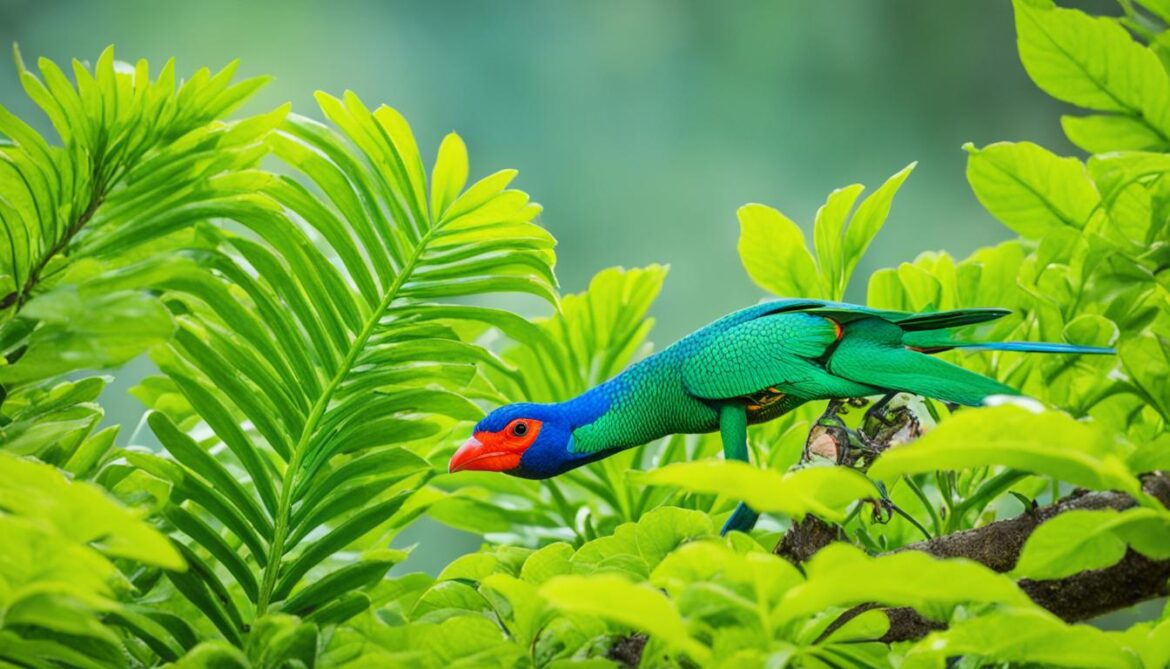
| Species |
Description |
Conservation Status |
| Amphibians |
Grenada is home to several amphibian species, contributing to the island’s diverse ecosystems. |
– |
| Lizards |
A variety of lizard species can be found in Grenada, inhabiting different habitats across the island. |
– |
| Snakes |
Grenada’s snake population includes both harmless and venomous species, playing important ecological roles. |
– |
| Birds |
Grenada hosts a diverse range of bird species, with 18 on the brink of extinction, necessitating conservation efforts. |
Threatened and endangered |
| Mammals and Bats |
Native mammals and bats thrive in Grenada, adding to the island’s unique biodiversity. |
– |
Threats to Grenada’s Biodiversity
Grenada’s biodiversity faces a range of challenges that jeopardize the delicate balance of its ecosystems. The primary threat comes from habitat loss, which is driven by various human activities such as agricultural expansion, housing settlement, infrastructure development, and commercial ventures. These activities encroach upon natural habitats, leading to the fragmentation and degradation of ecosystems. As a result, numerous plant and animal species that depend on these habitats for their survival are at risk of losing their homes.
Natural disasters pose another significant threat to Grenada’s biodiversity. The country is susceptible to hurricanes, forest fires, and pest infestation, which can have devastating effects on its flora and fauna. These events can cause widespread forest destruction, leading to the loss of vital habitats and the displacement or even extinction of species.
Unsustainable land use practices further exacerbate the threats to biodiversity in Grenada. The use of pesticides and insecticides in agriculture can contaminate the surrounding environment, harming both terrestrial and marine ecosystems. This pollution negatively impacts the health and survival of plant and animal species, disrupting crucial ecological processes.
The overexploitation of natural resources is also a significant concern for Grenada’s biodiversity. Unsustainable fishing practices, illegal wildlife trade, and unsustainable harvesting of plant species can deplete populations, disrupt food chains, and drive species to the brink of extinction.
Pollution is another threat to Grenada’s marine and coastal ecosystems. Pollution from land-based sources, such as agricultural runoff and sewage discharge, can cause eutrophication and harmful algal blooms, leading to oxygen depletion and the destruction of coral reefs and other sensitive habitats.
Climate change poses additional challenges for Grenada’s biodiversity. Rising temperatures, sea-level rise, and changing rainfall patterns can disrupt the delicate balance of ecosystems and cause shifts in species distributions. Climate change also increases the frequency and intensity of extreme weather events, further compromising the resilience of ecosystems and species.
Addressing these threats requires a comprehensive approach that includes sustainable land use practices, habitat conservation and restoration, pollution control measures, and proactive climate change adaptation strategies.
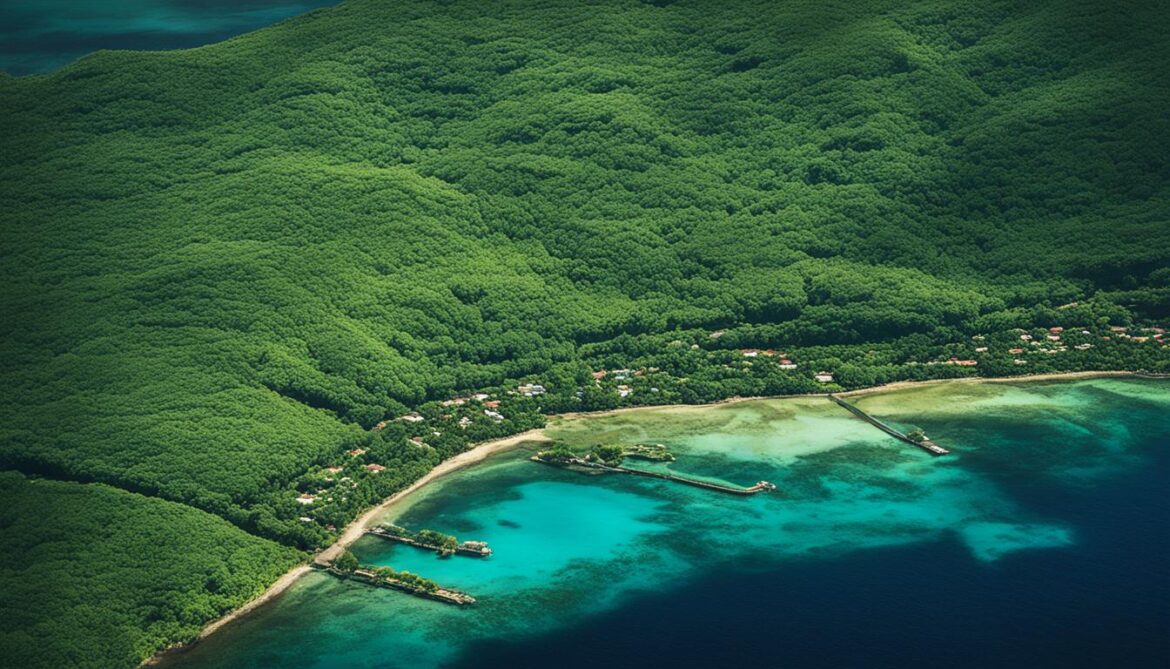
Only by recognizing and addressing these threats can Grenada safeguard its unique biodiversity, protecting the invaluable natural heritage for future generations to cherish.
Conservation Efforts in Grenada
Grenada is committed to enhancing conservation efforts and promoting sustainable development to safeguard its diverse ecosystems and rich biodiversity. Through the implementation of the National Biodiversity Strategy and Action Plan (NBSAP), Grenada sets out priority objectives for the conservation and sustainable use of its biodiversity. This strategic roadmap guides the country’s conservation initiatives and ensures that they align with international targets and best practices.
To protect key ecosystems and species, Grenada has designated various protected areas, including national parks, forest reserves, and marine protected areas. These protected areas serve as crucial habitats and contribute to the preservation of Grenada’s unique flora and fauna. They help maintain the ecological balance and provide opportunities for scientific research, education, and eco-tourism.
Collaborative initiatives such as the Caribbean Challenge Initiative and Sustainable Land Management Projects further support Grenada’s conservation efforts. These projects involve partnerships between government agencies, non-profit organizations, and international bodies to strengthen conservation practices, promote sustainable land use, and ensure the long-term viability of natural resources.
Grenada’s commitment to biodiversity conservation and sustainable development is vital for the preservation of its natural heritage and the well-being of its communities.
By prioritizing conservation, sustainable development, and responsible resource management, Grenada is working towards building a resilient and environmentally sustainable future. These efforts not only protect the unique biodiversity of the country but also contribute to the promotion of eco-friendly practices, sustainable tourism, and the overall well-being of its people.
Protected Areas in Grenada
| Name |
Type |
Location |
| Grand Etang National Park |
National Park |
St. Andrew Parish |
| La Sagesse Nature Center |
Nature Reserve |
St. David Parish |
| Morne Gazo |
Forest Reserve |
St. Patrick Parish |
| Carriacou Marine Protected Areas |
Marine Protected Area |
Carriacou Island |
Image: Grenada’s protected areas offer critical habitats for wildlife and contribute to the conservation of the country’s biodiversity.
Role of Sacred Natural Sites in Grenada
Sacred natural sites have a profound impact on Grenada’s cultural and spiritual heritage. These revered locations hold immense significance for local communities, as they are interwoven with traditional beliefs and practices. Beyond their cultural importance, these sacred sites also contribute to the preservation of unique ecosystems and serve as biodiversity hotspots.
The recognition of Grenada’s sacred sites by the authorities highlights the government’s commitment to their preservation and sustainable management. Efforts are made to incorporate traditional knowledge and practices into conservation strategies, ensuring the continued protection and appreciation of these sacred sites.
“Our sacred natural sites are the embodiment of our cultural heritage and spiritual connection to the land. Preserving these sites is not only essential for our traditional beliefs but also for safeguarding the rich biodiversity that thrives within them.” – Local community member
These sacred natural sites often possess a remarkable array of flora and fauna, thanks to their undisturbed and well-preserved ecosystems. By safeguarding these sites, Grenada can effectively conserve its natural heritage while also promoting sustainable land use practices.
Grenada’s commitment to preserving its sacred natural sites reflects the country’s broader efforts to protect its cultural legacy and promote sustainable development. By striking a balance between preservation and progress, Grenada aims to ensure that future generations can continue to appreciate the profound connection between spirituality, cultural heritage, and the natural environment.
Conservation through Cultural Preservation
Grenada places great importance on integrating traditional knowledge and practices into conservation efforts. By engaging with local communities and embracing their cultural heritage, Grenada ensures that conservation strategies are not only effective but also respectful of the deep-rooted connections between spirituality, tradition, and the natural world.
These collaborative efforts recognize the inherent value of Grenada’s sacred natural sites, not only for their biodiversity but also as integral components of the country’s identity and cultural fabric.

Sustainable Tourism and Environmental Protection in Grenada
Grenada is dedicated to promoting sustainable tourism practices that prioritize the protection of the environment and the conservation of natural resources. The country recognizes the importance of preserving its unique ecosystems and works towards minimizing negative impacts on the environment caused by tourism activities.
The tourism industry in Grenada is actively encouraged to adopt eco-friendly practices that align with principles of sustainability. By implementing measures such as waste reduction and recycling, energy conservation, and water management, businesses in the tourism sector contribute to the preservation of Grenada’s environmental integrity.
“Sustainable tourism is crucial for the long-term well-being of Grenada’s natural environments. By adopting eco-friendly practices, we can ensure that future generations will continue to enjoy the beauty and biodiversity that our country has to offer.” – Minister of Tourism, Grenada
Grenada’s diverse natural attractions make it a haven for eco-conscious travelers seeking authentic and sustainable experiences. The country boasts an array of nature reserves, wildlife sanctuaries, and breathtaking landscapes. Visitors can explore stunning rainforests, dive into vibrant coral reefs, and enjoy pristine beaches while knowing that their presence supports local environmental conservation initiatives.
Key Features of Grenada’s Sustainable Tourism
- Promotion of responsible tourism practices
- Support for local environmental conservation initiatives
- Integration of eco-friendly measures in tourism operations
- Protection of natural resources and wildlife habitats
- Preservation of Grenada’s cultural and natural heritage
Grenada’s commitment to sustainable tourism and environmental conservation ensures that visitors can explore the country’s natural wonders while leaving a minimal ecological footprint. By choosing Grenada as a sustainable travel destination, tourists contribute to the preservation of the country’s unique ecosystems and play a vital role in promoting responsible tourism practices globally.
| Benefits of Sustainable Tourism in Grenada |
Example |
| Preservation of natural resources |
By implementing eco-friendly practices, resorts in Grenada reduce water and energy consumption, minimizing the strain on local resources. |
| Enhanced local economy |
Sustainable tourism creates employment opportunities, promotes local businesses, and supports community development in Grenada. |
| Conservation of biodiversity |
Tourism revenue contributes to the protection of Grenada’s diverse ecosystems, aiding in the conservation of endangered species and habitats. |
| Cultural exchange |
Grenadian communities and travelers have the opportunity for meaningful cultural exchanges, fostering a deeper understanding and appreciation of local traditions. |
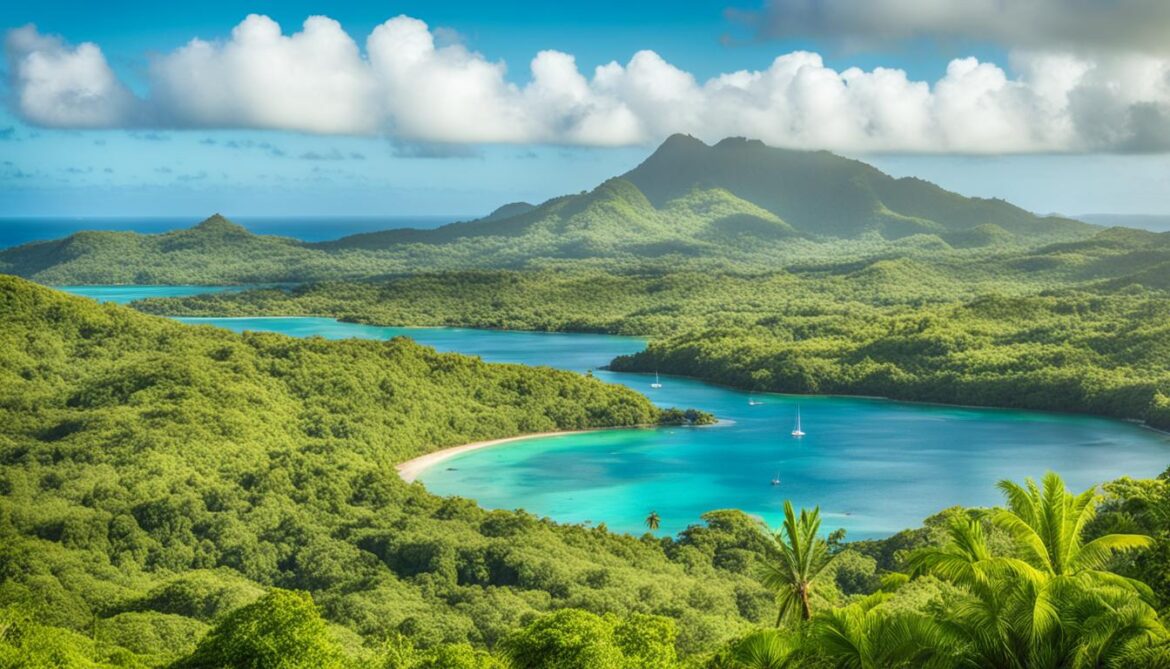
Grenada’s commitment to sustainable tourism practices combined with its stunning natural landscapes and rich biodiversity make it an enticing destination for eco-conscious travelers seeking meaningful experiences. By supporting environmental conservation efforts through sustainable tourism, visitors can contribute to the long-term preservation and protection of Grenada’s natural heritage.
Challenges and Opportunities for Biodiversity Conservation in Grenada
Grenada faces several challenges in biodiversity conservation, which require focused strategies and actions to ensure the sustainable development of the country. One of the major challenges is habitat loss, resulting from various factors such as agricultural expansion, housing settlements, and infrastructure development. The loss of natural habitats has a significant impact on the ecosystems and the species that depend on them.
Invasive species also pose a threat to Grenada’s biodiversity. These non-native species can outcompete native species for resources and disrupt the delicate balance of the ecosystem. The proliferation of invasive species can lead to the decline or even extinction of native species, further exacerbating the biodiversity challenges in Grenada.
Climate change is another pressing issue that affects Grenada’s biodiversity. Rising temperatures, changing rainfall patterns, and increased frequency of extreme weather events can all have profound impacts on ecosystems and the species they support. Adapting to these changes and implementing resilient conservation strategies is crucial to safeguarding Grenada’s biodiversity.
Inadequate legislation and enforcement also pose challenges to biodiversity conservation in Grenada. Strengthening existing laws and regulations, as well as ensuring their effective implementation, is essential for protecting ecosystems, managing natural resources responsibly, and addressing threats to biodiversity.
“The conservation of biodiversity in Grenada is a complex task that requires concerted efforts and collaboration between various stakeholders at local, national, and international levels.”
Addressing these challenges presents opportunities for enhancing biodiversity conservation efforts in Grenada. Raising public awareness about the value of biodiversity and the importance of its conservation can mobilize support and generate greater public engagement. Engaging local communities in conservation initiatives and involving them in decision-making processes can foster a sense of ownership and empower them to become active contributors to biodiversity conservation.
Integrating biodiversity considerations into land use planning is crucial for sustainable development. By incorporating biodiversity into development plans, Grenada can strike a balance between economic activities and the preservation of natural habitats. Designating protected areas and implementing effective management practices can also contribute to safeguarding biodiversity and providing safe havens for threatened species.
The tourism industry in Grenada presents an opportunity to support biodiversity conservation through sustainable practices. By promoting ecotourism and adopting sustainable tourism standards, Grenada can leverage tourism as a source of conservation financing, while also ensuring that visitors have authentic and responsible experiences in the country’s natural heritage.
Conservation Strategies and Sustainable Development Goals
Grenada has developed conservation strategies and is actively working towards achieving the Sustainable Development Goals (SDGs) set by the United Nations. The conservation strategies focus on improving coordination among stakeholders, capacity-building for conservation practitioners, and securing funding for biodiversity conservation initiatives.
By aligning their efforts with the SDGs, Grenada aims to promote the integration of biodiversity considerations into policies and practices across various sectors, including agriculture, forestry, fisheries, and tourism. These goals provide a framework for sustainable development that encompasses social, economic, and environmental dimensions.
Ultimately, the challenges faced by Grenada in biodiversity conservation pave the way for innovative solutions and greater collaboration. By seizing the opportunities presented by public engagement, land use planning, and sustainable tourism, Grenada can overcome these challenges and achieve its conservation goals, ensuring a thriving and resilient natural environment for future generations.
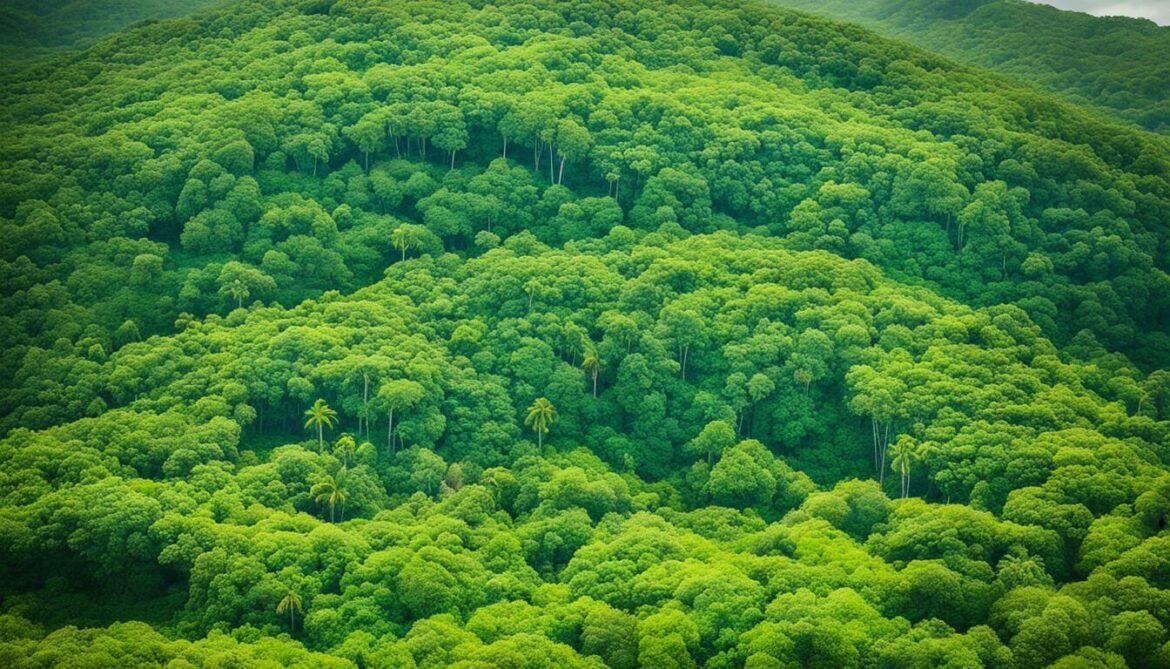
International Collaboration in Biodiversity Conservation in Grenada
Grenada actively collaborates with international organizations and partners to strengthen biodiversity conservation efforts. The country engages in initiatives such as the Ramsar Convention, which promotes the wise use and conservation of wetlands, and implements the Aichi Biodiversity Targets set by the Convention on Biological Diversity. Grenada also benefits from technical assistance and funding from international conservation organizations to support capacity-building, research, and conservation projects.
Partnerships for Conservation
Grenada values the importance of international partnerships in achieving its conservation goals. Through collaboration with organizations such as the United Nations Environment Programme (UNEP) and the Caribbean Biodiversity Fund (CBF), Grenada can tap into valuable expertise, resources, and funding opportunities. These partnerships enable the country to develop and implement effective strategies for biodiversity conservation and sustainable development.
“We recognize that conservation is a global effort, and by working together with international organizations and partners, we can achieve more to protect Grenada’s unique ecosystems and species.” – Minister of Environment, Grenada
Conservation Organizations
Grenada actively engages with conservation organizations to enhance its biodiversity conservation efforts. One prominent organization is the Grenada Fund for Conservation (GFC), which focuses on preserving the country’s natural heritage through targeted initiatives and projects. The GFC collaborates with local communities, government agencies, and international partners to implement conservation programs, raise awareness, and promote sustainable practices.
Another key organization is the Caribbean Natural Resources Institute (CANARI), which provides technical assistance and capacity-building support to advance biodiversity conservation in Grenada and the wider Caribbean region. CANARI works closely with stakeholders to develop policies, conduct research, and facilitate knowledge-sharing to ensure effective conservation outcomes.
Global Cooperation for Biodiversity
Grenada recognizes the importance of global cooperation in addressing biodiversity challenges. The country actively participates in international forums and agreements to contribute to global conservation efforts. By being a signatory to the Convention on Biological Diversity and the Ramsar Convention, Grenada reaffirms its commitment to conserving and sustainably utilizing its natural resources.
Through participation in initiatives like the Global Environment Facility (GEF), Grenada can access funding and technical support for biodiversity conservation projects. The GEF works with countries worldwide to address environmental issues and promote sustainable development.
International Partnerships and Conservation Organizations in Grenada
| Organization |
Focus Areas |
| United Nations Environment Programme (UNEP) |
Providing technical assistance and funding for conservation projects |
| Caribbean Biodiversity Fund (CBF) |
Supporting capacity-building and financial resources for biodiversity conservation |
| Grenada Fund for Conservation (GFC) |
Implementing targeted conservation initiatives and programs |
| Caribbean Natural Resources Institute (CANARI) |
Providing technical assistance and knowledge-sharing for biodiversity conservation |
| Global Environment Facility (GEF) |
Supporting funding and technical assistance for biodiversity conservation projects |
International collaboration and partnerships play a vital role in Grenada’s efforts to preserve its unique biodiversity and ecosystems. By working together with global organizations and conservation partners, Grenada can enhance its capacity, share knowledge, and implement effective strategies for the sustainable conservation of its natural heritage.
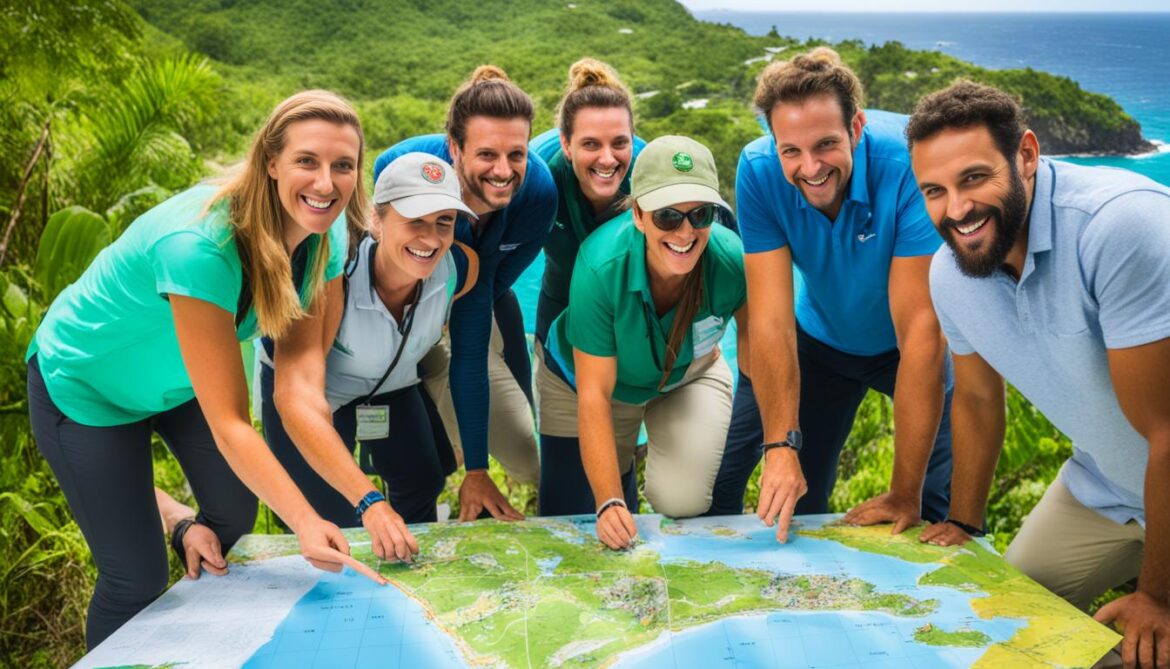
Importance of Public Engagement and Education
Public engagement and education are vital components of biodiversity conservation in Grenada. By raising awareness among local communities, youth, and visitors, we can emphasize the significance of preserving natural resources and ecosystems for the long-term success of conservation efforts.
One effective method of promoting environmental awareness is through Grenada environmental education programs. These initiatives equip individuals with valuable knowledge and skills, empowering them to make informed decisions that positively impact the environment. By educating the public about the importance of biodiversity and the role each person can play in its conservation, we foster a culture of responsible environmental stewardship.
Moreover, community involvement is crucial for effective biodiversity conservation. Engaging with local communities allows us to develop collaborative approaches that align with their needs, values, and traditional practices. This community-centered approach not only ensures the inclusion of diverse perspectives but also promotes a sense of ownership and responsibility for environmental protection.
“The greatest threat to our planet is the belief that someone else will save it.”
– Robert Swan
Conservation outreach plays a pivotal role in fostering Grenada public awareness and encouraging active participation. By organizing events, workshops, and awareness campaigns, we can effectively communicate the importance of biodiversity and its conservation to a wider audience. This outreach effort enables us to inspire individuals to make positive changes in their daily lives and actively contribute to the preservation of Grenada’s natural heritage.
Through these collective efforts, we aim to build a society that values and protects the environment, ensuring a sustainable future for both current and future generations.
Key elements of public engagement and education:
- Environmental education programs
- Collaborative community initiatives
- Conservation outreach campaigns
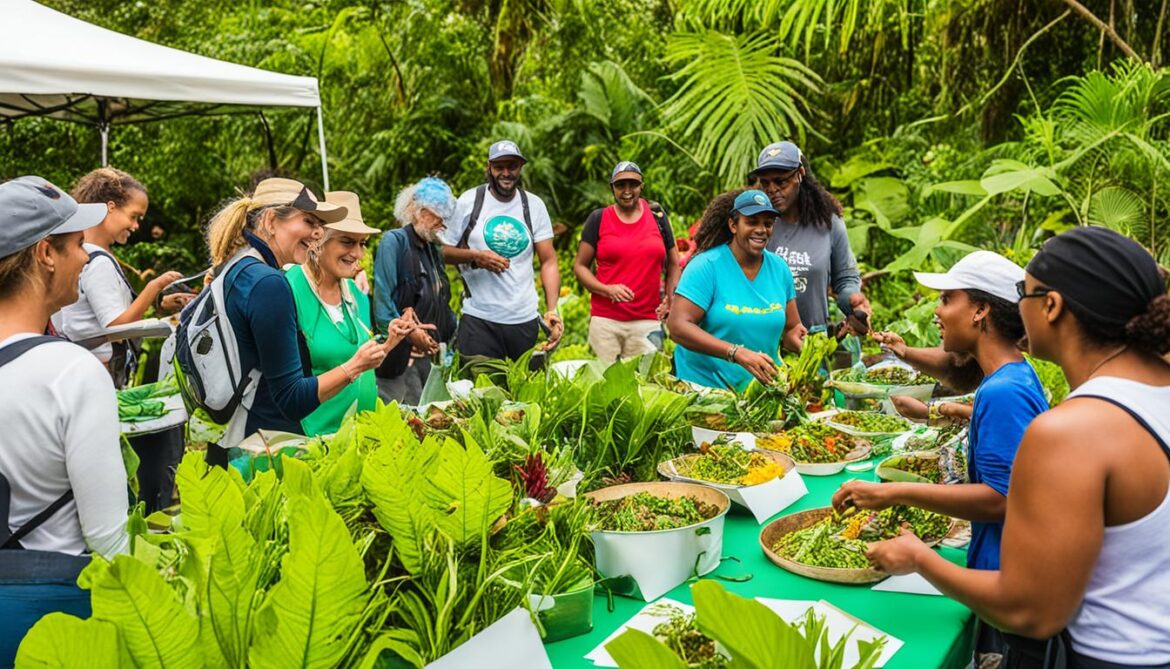
| Benefits of Public Engagement and Education |
How It Contributes to Biodiversity Conservation |
| Increased awareness and understanding of biodiversity |
Encourages individuals to make informed decisions that support conservation efforts |
| Empowerment through knowledge and skills |
Equips individuals to actively participate in environmental protection |
| Fosters a sense of responsibility and ownership |
Engages communities in the preservation of natural resources |
| Promotes behavior change towards sustainability |
Inspires individuals to adopt environmentally friendly practices |
Conclusion
Grenada’s sacred natural sites and rich biodiversity are invaluable treasures that require constant conservation efforts. The country has made remarkable progress in safeguarding its ecosystems, establishing protected areas, and implementing sustainable practices in tourism and land management. Through active collaboration with international partners, engagement with the public, and ongoing conservation initiatives, Grenada is committed to preserving and responsibly utilizing its natural resources for the enjoyment of future generations.
By valuing the importance of its unique ecosystems, Grenada has achieved significant milestones in biodiversity conservation. The establishment of protected areas, such as national parks and forest reserves, has been instrumental in safeguarding critical habitats and supporting the survival of endemic species. Furthermore, the implementation of sustainable practices in tourism and land management demonstrates Grenada’s dedication to balancing economic development with environmental protection.
Despite the challenges posed by habitat loss, invasive species, and climate change, Grenada remains steadfast in its commitment to conservation. The country recognizes the power of public engagement and education in driving long-term conservation success. By raising awareness among local communities, empowering youth, and involving visitors, Grenada is cultivating a culture of sustainable environmental stewardship.
In conclusion, Grenada’s biodiversity conservation achievements highlight the country’s dedication to preserving its natural heritage. Through collaborative efforts, sustainable practices, and public involvement, Grenada is paving the way for a future where its sacred natural sites and rich biodiversity continue to thrive.
FAQ
What are some of the diverse ecosystems found in Grenada?
Grenada is home to diverse ecosystems such as mangrove swamps, coral reefs, sea grass beds, beaches, and dry woodlands.
How many watersheds does Grenada have?
Grenada has 71 distinct watersheds.
What are some of the unique plant and animal species found in Grenada?
Grenada has two endemic plant species – the Grand Etang Fern and the Cabbage Palm – and one endemic tree species, the Maythenus grenadensis. The country also has a diverse range of wildlife, including amphibians, lizards, snakes, birds, and native mammals and bats.
What are the threats to Grenada’s biodiversity?
Grenada’s biodiversity faces threats such as habitat loss, natural disasters, unsustainable land use practices, pollution, overexploitation, and the impacts of climate change.
What conservation efforts are in place in Grenada?
Grenada has designated protected areas, including national parks, forest reserves, and marine protected areas, to safeguard key ecosystems and species. The country also has a National Biodiversity Strategy and Action Plan (NBSAP) outlining priority objectives for conservation and sustainable use of biodiversity.
What is the role of sacred natural sites in Grenada?
Sacred natural sites in Grenada play a crucial role in preserving traditional beliefs and practices, as well as conserving unique ecosystems and serving as biodiversity hotspots.
How does Grenada promote sustainable tourism and environmental protection?
Grenada encourages eco-friendly practices in the tourism industry and supports local environmental conservation initiatives. The country’s diverse natural attractions attract eco-conscious travelers seeking authentic and sustainable experiences.
What are the challenges and opportunities for biodiversity conservation in Grenada?
Grenada faces challenges such as habitat loss, invasive species, climate change, and inadequate legislation and enforcement. However, opportunities lie in raising public awareness, engaging local communities, integrating biodiversity considerations into land use planning, and harnessing the potential of sustainable tourism for conservation financing.
How does Grenada collaborate with international organizations for biodiversity conservation?
Grenada actively collaborates with international organizations and partners, participating in initiatives such as the Ramsar Convention and implementing the Aichi Biodiversity Targets set by the Convention on Biological Diversity. The country also receives technical assistance and funding for capacity-building, research, and conservation projects.
What is the importance of public engagement and education in biodiversity conservation in Grenada?
Public engagement and education are essential for raising awareness among local communities, youth, and visitors about the importance of preserving natural resources and ecosystems in Grenada. Environmental education programs, community-based initiatives, and conservation outreach activities contribute to building a culture of sustainable environmental stewardship.
Source Links


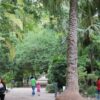



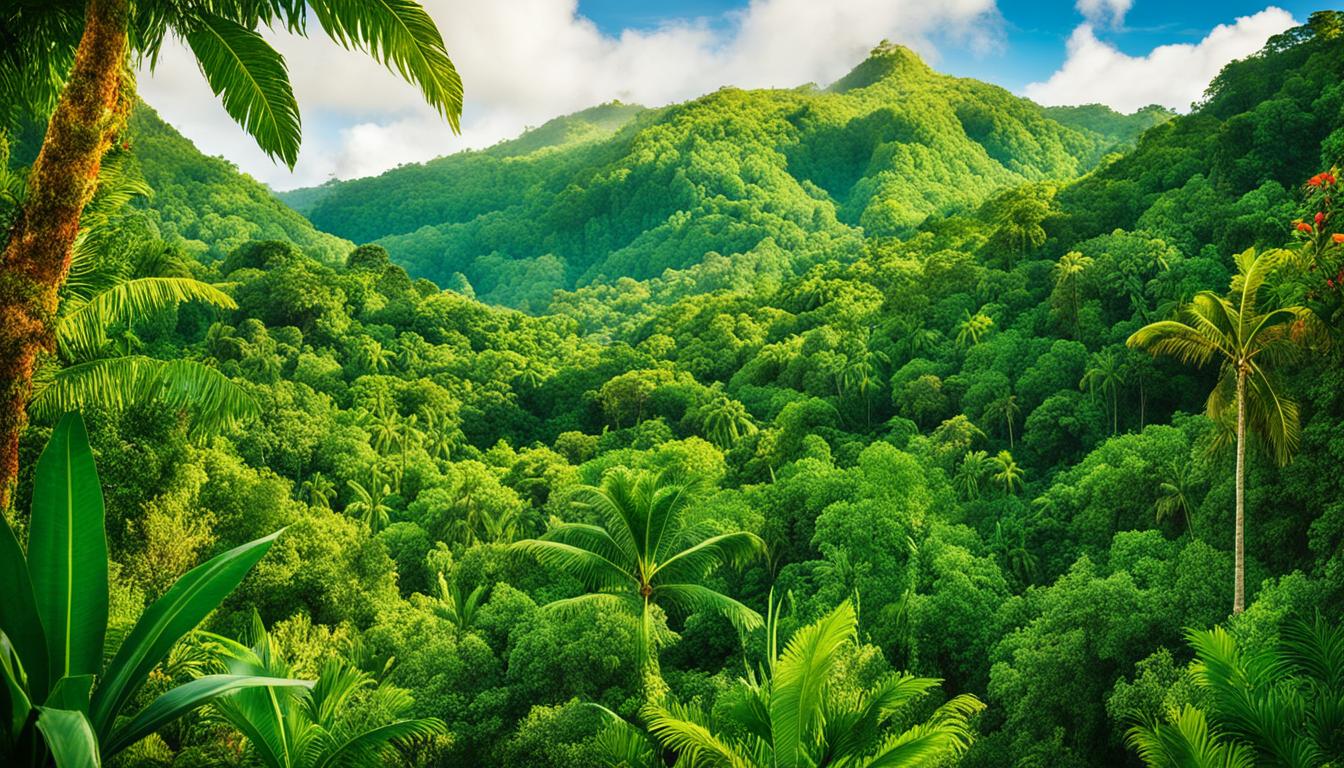








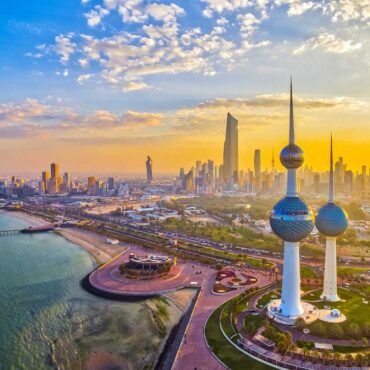









Post comments (0)